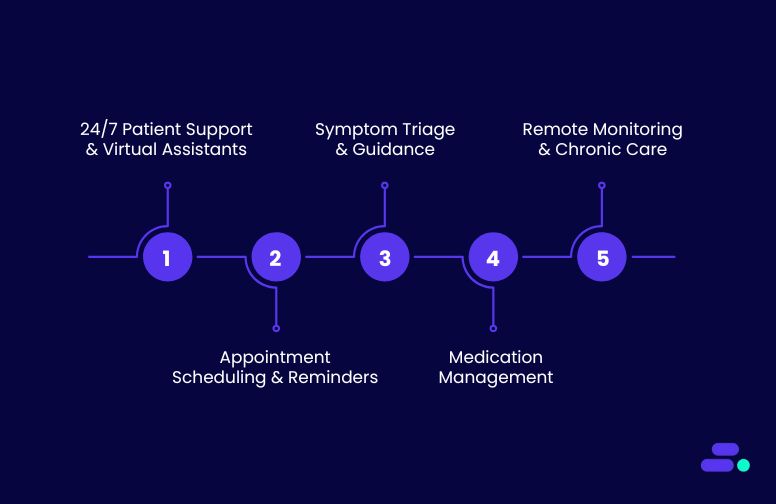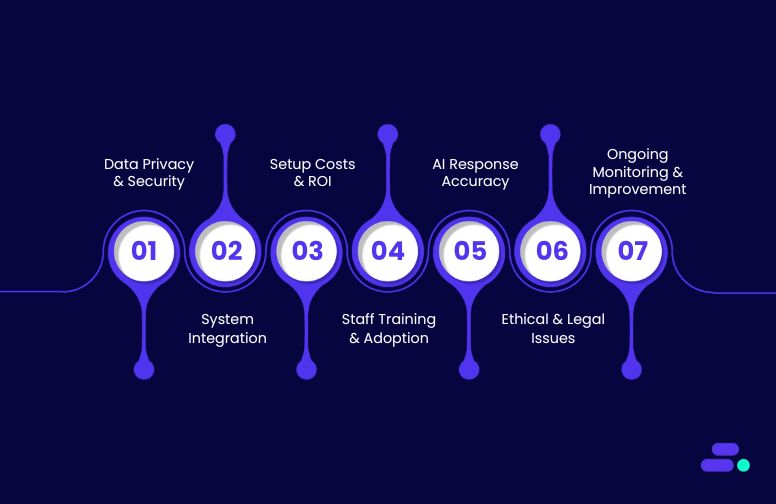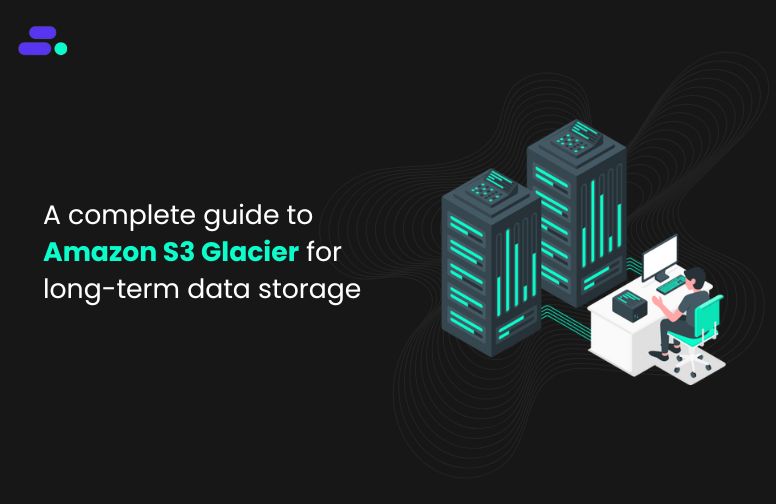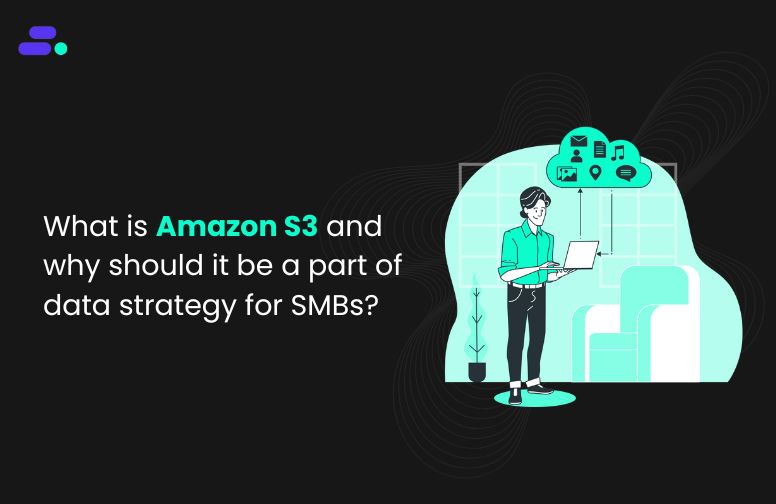This is a div block with a Webflow interaction that will be triggered when the heading is in the view.

Modernize your cloud. Maximize business impact.
According to Gartner, more than 85% of organizations will have embraced a cloud-first strategy by 2025. But for most of these organizations, especially SMBs, managing cloud infrastructure in-house might feel like trading one set of IT challenges for another. From talent shortages to escalating costs, maintaining secure, scalable environments often stretches lean teams beyond capacity.
That’s why more SMBs are turning to cloud managed services, not just to offload technical work, but to unlock real business agility. The value goes beyond uptime. With 24/7 monitoring, built-in security, and cost-optimized operations, SMBs can shift focus from fire-fighting IT issues to delivering innovation.
This article will dive deeper into the key reasons why SMBs are increasingly choosing managed cloud services over in-house operations.
Key takeaways:
- MSPs simplify cloud complexity: Managed Service Providers handle infrastructure, automation, security, and cost optimization, so SMBs can focus on growth, not IT management.
- They turn cloud into a business advantage: Beyond maintenance, MSPs help SMBs modernize applications, improve performance, and extract more value from AWS investments.
- Cost control is proactive, not reactive: With real-time monitoring, rightsizing, and savings plans, MSPs ensure cloud spending stays aligned with business needs.
- Support is continuous, not just during office hours: MSPs offer 24/7 monitoring, automated incident response, and escalation paths to safeguard critical workloads.
- MSPs are partners in strategy, not just support: The right MSP brings cloud expertise, business alignment, and shared accountability to help SMBs scale with confidence.
How can cloud managed services help SMBs?
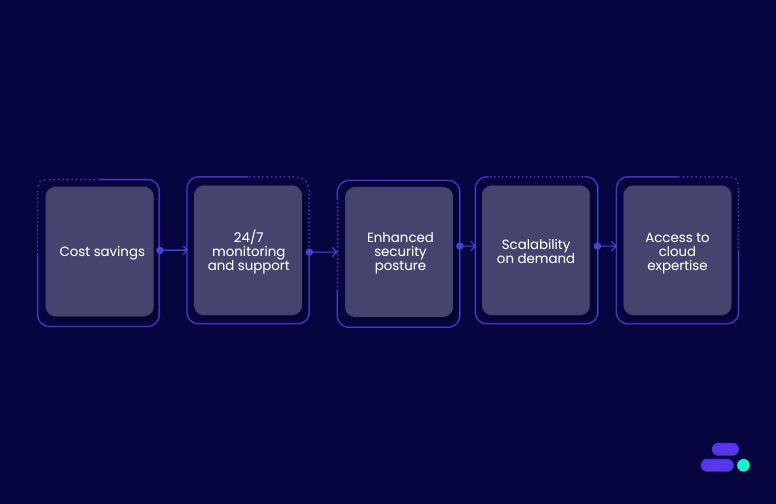
Managing cloud infrastructure in-house often becomes a bottleneck for SMBs. Hiring and retaining skilled cloud professionals is costly and time-consuming, and internal IT teams are frequently stretched thin maintaining uptime, updates, and security.
Take the case of a healthcare provider managing its patient data and telemedicine platform on the cloud. While it gives scalability, the in-house IT team is overwhelmed, juggling patch management, uptime monitoring, and security audits, all while lacking deep cloud expertise. Hiring additional DevOps engineers isn't financially viable, and gaps in backup and compliance threaten patient data integrity.
By partnering with a cloud managed service provider (MSP), they can offload day-to-day operations like system monitoring, patching, and security updates. The MSP implements automated backup policies, ensures HIPAA compliance, and introduces 24/7 alerting through AWS-native tools. The result? Improved uptime, faster support response times, and a reduction in operational IT costs.
This shift allows the internal team to refocus on improving the patient experience, rolling out new features and digital services without being slowed down by infrastructure worries.
Key benefits of working with an MSP include:
- Cost savings: Reduce the need for full-time cloud experts, on-prem infrastructure, and ad hoc consulting by shifting to predictable, subscription-based models.
- 24/7 monitoring and support: Ensure round-the-clock availability and fast incident response without the need for internal shift rotations.
- Enhanced security posture: Get continuous vulnerability monitoring, patch management, and compliance reporting, often using AWS-native tools like GuardDuty, CloudTrail, and Config.
- Scalability on demand: Easily scale infrastructure up or down based on real-time business needs, without long procurement cycles.
- Access to cloud expertise: Tap into certified professionals who stay updated with evolving AWS best practices, architectures, and compliance requirements.
Cloud managed services turn reactive IT into a proactive, value-driving function without the burden of building everything in-house.

Top 5 reasons why SMBs choose cloud managed services
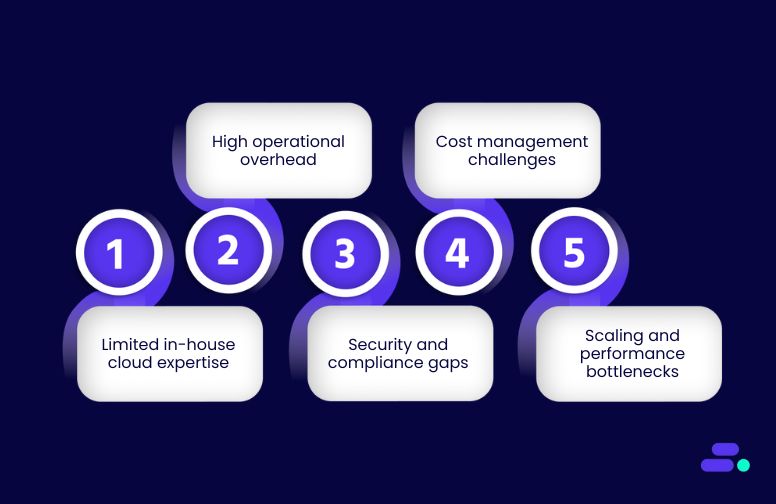
SMBs dealing with limited budgets, human resources shortages, and growing cloud complexity partner with a managed service provider (MSP) for strategic benefits, including enterprise-grade cloud capabilities, proactive support, and operational resilience without the overhead of building internal teams.
There are several reasons why a SMB might choose to work with a MSP. It’s not just about outsourcing IT but unlocking agility, reducing risk, and focusing on growth.
1. Limited in-house cloud expertise
Many SMBs begin their cloud journey without the specialized knowledge required to navigate AWS’s complex ecosystem. Hiring AWS-certified professionals such as cloud architects, DevOps engineers, or security experts is expensive. Attracting and retaining them in a competitive market adds further pressure. For small teams, building in-house capability can take months, delaying key cloud initiatives.
How this impacts business:
- Misconfigurations expose vulnerabilities: Poorly implemented IAM roles, insecure Amazon S3 buckets, or misconfigured VPCs can lead to security incidents or compliance breaches.
- Overprovisioned resources inflate costs: Without deep understanding of AWS pricing models, teams often choose oversized Amazon EC2 instances or underutilize services, leading to significant cost inefficiencies.
- Innovation slows down: Internal teams are pulled into reactive support and troubleshooting, diverting focus from product development and business growth.
MSP Solution: A cloud MSP or an AWS partner brings instant access to AWS-certified experts who apply proven architectural patterns and best practices from the start. They’ll know how to utilize tools like AWS Control Tower for multi-account governance, AWS Well-Architected Framework to identify and fix workload risks, and AWS CloudFormation or Terraform for consistent, repeatable infrastructure deployment. MSPs can also help optimize cost through right-sizing, usage monitoring, and implementation of Savings Plans or Reserved Instances, while ensuring workloads are secure, compliant, and well-architected.
2. High operational overhead
Managing cloud operations, including patching, backups, scaling, monitoring, can quickly overwhelm small IT teams, especially when they’re already juggling daily support, user requests, and legacy infrastructure. As the number of cloud services grows, maintaining performance, reliability, and compliance becomes increasingly complex.
How this impacts business:
- Uptime and performance suffer: Without proactive monitoring and auto-remediation, downtime incidents take longer to detect and resolve, frustrating users and customers.
- Manual monitoring misses critical events: Relying on scripts or ad hoc checks means serious issues like CPU spikes, failed backups, or misbehaving apps can go unnoticed until they cause major disruptions.
- Internal resources are drained: Skilled staff spend time managing maintenance windows, updates, or backup schedules instead of focusing on improving applications or customer experience.
MSP Solution: A cloud MSP or an AWS partner streamlines operational burden by delivering round-the-clock monitoring, automation, and incident management. Using AWS-native tools like Amazon CloudWatch (for real-time performance metrics and alerts), AWS Systems Manager (for fleet-wide automation and patching), and AWS Backup (for centralized backup orchestration), MSPs reduce downtime risks and human error. They implement scaling policies, define runbooks, and proactively manage SLAs, ensuring critical workloads remain available, secure, and performant with minimal internal effort.
3. Security and compliance gaps
SMBs may sometimes lack the tools, time, and expertise required to maintain enterprise-grade cloud security. Implementing continuous monitoring, data encryption, identity access management, and audit readiness across environments demands dedicated effort and specialized skills. For lean IT teams, this might be deprioritized until an incident forces action.
How this impacts business:
- Increased risk of breaches or ransomware: Without intrusion detection, patch management, and network segmentation, attackers can exploit misconfigurations and outdated systems.
- Failure to meet regulatory standards: Regulations like HIPAA, GDPR, or SOC 2 require constant tracking of data handling practices, encryption, and access logs. Failing to do so results in fines and reputational damage.
- Loss of customer trust and legal exposure: A single publicized security incident or compliance violation can erode customer confidence and invite lawsuits or contract cancellations.
MSP Solution: A cloud MSP or an AWS partner provides layered, AWS-native security and governance from day one. They use AWS IAM to enforce least-privilege access, AWS GuardDuty for continuous threat detection, and AWS KMS for encryption key management. AWS Config enables real-time tracking of resource changes and drift from security baselines. MSPs also handle compliance mapping (e.g., to CIS benchmarks or HIPAA frameworks), automate auditing and remediation, and provide ongoing visibility into the security posture through centralized dashboards and alerts, reducing risk without overloading internal teams.

4. Cost management challenges
Cloud services like AWS offer unmatched scalability and pay-as-you-go pricing, but this also means a labyrinth of services, pricing models, and billing intricacies. For SMBs without cloud financial expertise, costs can escalate quickly due to lack of proactive governance, architectural inefficiencies, or simply forgetting to turn things off.
How this impacts business:
- Idle resources and overprovisioning inflate bills: Unused EC2 instances, unattached EBS volumes, or underutilized RDS databases silently accumulate costs every month.
- No visibility means poor forecasting: Without consolidated billing, tagging strategies, or cost anomaly detection, finance teams struggle to track usage or plan budgets effectively.
- Inefficient architecture increases long-term TCO: Choosing the wrong storage class (e.g., using Amazon S3 Standard when Infrequent Access would suffice) or not using auto-scaling can lead to high operational overhead.
MSP Solution: A Cloud MSP or an AWS partner helps SMBs establish financial discipline on AWS from day one. They set up detailed tagging policies, budgets, and alerts using AWS Budgets, Cost Explorer, and AWS Cost Anomaly Detection. MSPs also implement architectural optimizations. This includes auto-scaling groups, rightsizing recommendations, and Amazon S3 lifecycle policies to match consumption to actual demand. They review architecture regularly and guide adoption of Savings Plans, Reserved Instances, or spot instances where appropriate, aligning cloud spend with business value and preventing bill shock.
5. Scaling and performance bottlenecks
As an SMB’s user base grows or application workloads increase, their cloud infrastructure must scale seamlessly to maintain performance and reliability. However, designing for elasticity, managing service quotas, and ensuring availability across regions or Availability Zones (AZs) is complex. Without proactive planning, systems become vulnerable to traffic spikes or component failures.
How this impacts business:
- Downtime or degraded performance during peak loads: Inability to handle traffic surges can crash applications or lead to sluggish experiences.
- Loss of revenue and brand reputation: Users expect responsive services; delays or outages can result in churn, cart abandonment, or lost transactions.
- Reactive scaling leads to inefficiencies: Without automated scaling or forecasting, teams scramble to provision resources manually, often too late or too expensively.
MSP Solution: Cloud MSPs and AWS partners design infrastructure with scalability and resilience at the core. They implement AWS Auto Scaling, Elastic Load Balancing (ELB), and Amazon EC2 Spot Fleets to adjust capacity dynamically based on demand. To ensure high availability, MSPs distribute workloads across multiple Availability Zones and architect for fault tolerance using services like Amazon Route 53, Amazon RDS Multi-AZ, and Amazon S3 cross-region replication.
They also use tools like AWS Fault Injection Simulator and Amazon CloudWatch Synthetics to simulate failures and proactively identify bottlenecks, ensuring the system performs reliably under pressure and scales as the business grows.

Why should SMBs choose Cloudtech as their AWS partner?
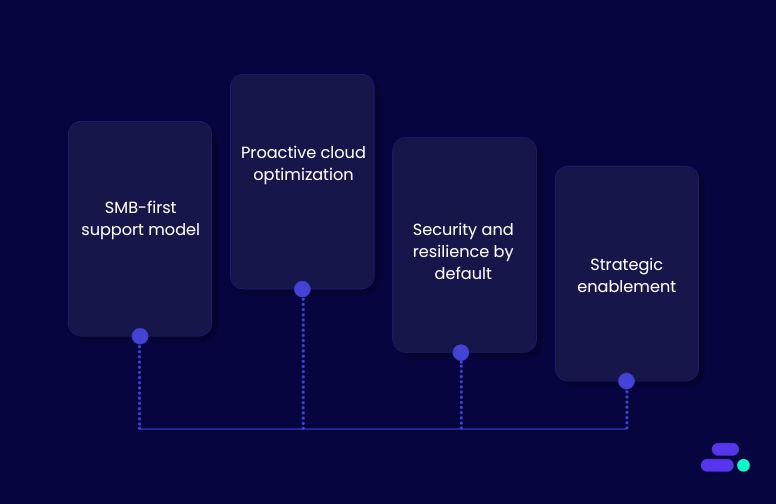
Behind every resilient, cost-efficient cloud operation is a partner who not only knows AWS, but knows how small and mid-sized businesses work. Cloudtech, an AWS Advanced Tier Services Partner focused exclusively on SMBs, delivers managed cloud services that go beyond maintenance. It helps companies scale with confidence, operate securely, and stay focused on what they do best.
Here’s how Cloudtech stands out as a Managed Service Provider for SMBs on AWS:
- SMB-first support model: 24/7 monitoring, incident response, and patch automation designed for lean teams, without bloated contracts or vendor lock-in.
- Proactive cloud optimization: Continuous performance, cost, and security tuning using AWS-native tools like Amazon CloudWatch, Trusted Advisor, and Config.
- Security and resilience by default: Built-in multi-AZ architecture, automated backups, IAM best practices, and GuardDuty for always-on protection.
- Strategic enablement: Cloudtech goes beyond ticket handling, delivering hands-on guidance, cost control, and knowledge transfer to help SMBs scale with confidence.
With a strong track record of helping small and mid-sized businesses succeed on AWS, Cloudtech brings enterprise-grade expertise with SMB-aligned execution. That means faster outcomes, clearer ROI, and a partner that grows with the business.
See how other SMBs have modernized, scaled, and thrived with Cloudtech’s support →

Wrapping up
Managing cloud environments in-house often means choosing between focus and fire drills. That’s why having the right AWS partner makes all the difference, not just by keeping systems running, but by driving smarter operations, lower costs, and faster innovation.
What makes Cloudtech different is its SMB-first approach to managed services. It is proactive, cost-aware, and aligned to business goals. With deep AWS expertise and a track record of success, they don’t just support cloud transition, they help SMBs thrive on it.
Ready to simplify operations and scale with confidence? Discover how Cloudtech’s managed services can power your next phase of growth.
FAQs
1. How is Cloudtech different from a traditional managed service provider (MSP)?
Unlike traditional MSPs that focus on legacy infrastructure and ticket-based support, Cloudtech is a cloud-native AWS Advanced Tier Partner. Their model emphasizes automation, scalability, and continuous improvement. Cloudtech’s team designs and manages environments using AWS best practices, including auto-scaling, serverless orchestration, and proactive monitoring, enabling SMBs to move faster, stay secure, and evolve continuously without being held back by legacy IT processes.
2. Is managed cloud support from Cloudtech affordable for small and mid-sized businesses?
Yes. Cloudtech’s services are built specifically for SMBs and are designed to be cost-effective without compromising quality. Instead of one-size-fits-all contracts, they offer flexible, outcome-based support tiers. Clients only pay for what they need, resulting in better ROI, reduced cloud waste, and faster access to cloud benefits.
3. What kind of support does Cloudtech offer outside regular working hours?
Cloudtech offers proactive 24/7 cloud monitoring and alerting for critical workloads as part of its managed services model. Using AWS-native tools like Amazon CloudWatch, AWS Config, and CloudTrail, the Cloudtech team ensures that infrastructure performance, availability, and security are continuously tracked, even outside standard business hours. While real-time issue detection is automated, any critical incidents are escalated based on agreed SLAs. For SMBs without in-house night or weekend coverage, this provides confidence that their environments are being actively observed, even when their team is offline.
4. How does Cloudtech help optimize and control AWS costs over time?
Cloudtech takes a proactive approach to cloud cost management. Their team continuously monitors usage with AWS Cost Explorer, Trusted Advisor, and CloudWatch metrics, identifying opportunities to rightsize infrastructure, reduce waste, and apply appropriate pricing models like Savings Plans and Reserved Instances. By aligning spend with business goals, Cloudtech ensures SMBs stay lean, predictable, and financially efficient on AWS.
5. Will SMBs still retain control and visibility over their AWS environment with Cloudtech?
Absolutely. Cloudtech promotes a shared ownership model. Clients retain full access, visibility, and governance over their AWS accounts. As part of every engagement, Cloudtech provides clear documentation, monitoring dashboards, and knowledge transfer to ensure internal teams are empowered, not sidelined. Their goal is to enhance the client’s capabilities, not replace them, offering expert guidance while keeping businesses in the driver’s seat.

Get started on your cloud modernization journey today!
Let Cloudtech build a modern AWS infrastructure that’s right for your business.

